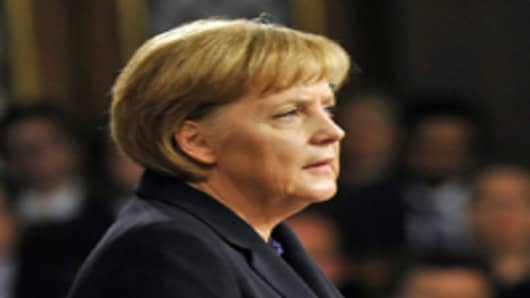European leaders are working feverously to create what German Chancellor Merkel is calling a “fiscal union” to restore private investor confidence in Europe and rekindle growth.
Unfortunately, what she advocates will thrust Europe into a deeper economic crisis, and leave European leaders without the fiscal and monetary policy tools necessary to combat recessions.
The reforms Chancellor Merkel is pushing—hard caps on national government deficits--will ensure either the ultimate demise of the euro, years of economic stagnation or worse. For many governments, those caps will be one half or even one quarter of recent annual deficits, and to comply they will dramatically raise taxes, cut spending and curtail pensions and other social benefits.
Already, the Mediterranean economies are contracting rapidly, and Germany and other more prosperous states are near zero growth. Harsh austerity in France, Italy, and elsewhere will be “negative stimulus” and thrust most if not the entire continent into a deep and prolonged recession .
Rising unemployment will feed on itself, national tax bases will shrink, and sovereign debtwill become less manageable. Private investors, though perhaps initially comforted after Merkel’s reforms are adopted, again will become skeptical that Italy and the others will pay their debts and flee government bonds.
European governments will be impotent to address the recession, because Merkel’s enforceable caps on national budget deficits will not create a “fiscal union.” The euro zone as a whole and the larger European Union will continue to lack the fiscal and monetary policy tools U.S. and Japanese governments have to manage recessions.
The U.S. federal government has broad taxing, spending and borrowing authority, and jointly with the states, finances social security and pensions, health care and other essential public services. Although the 50 states face significant limits on how much they can borrow during a recession, Washington can increase its deficit to further assist states, and it cuts taxes and spends more directly on new projects to stimulate the private sector.
The Great Recession would have been longer and deeper without those fiscal powers— powers the European Union now lacks and still lack after Merkel’s reforms.
Until now, responsibilities for combating recessions in Europe fell entirely on the individual member governments. With Merkel’s reforms, those governments won’t be able to increase deficits to stem unemployment, and Brussels still won’t be able to do it for them, as Washington does for the 50 states.
The European Central Bank could push down short term interest rates but as we have learned, yet again in the United States, that primary instrument of monetary policy is not much help for stemming recessions. Moreover, because the European Union lacks taxing powers and does not issue euro denominated bonds, the ECB, for example, can’t buy long-term debt on a scale similar to the Federal Reserve to engage in quantitative easing. Simply, the ECB has fewer tools than the Fed.


